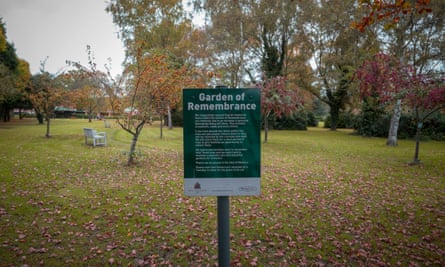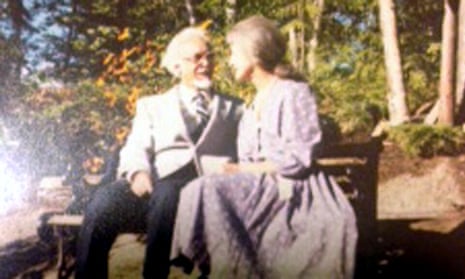The death of an 84-year-old man who died in shackles after being detained at Gatwick airport was a “wholly unacceptable” and “shameful” end to his life, an independent investigation found.
A scathing report by the prisons ombudsman on the death of engineer Alois Dvorzac, who was suffering dementia and stopped on his way from Canada to Slovenia to see his daughter, concluded that his detention by the Home Office was on “the threshold of inhuman and degrading”.
The report was completed in July 2014 and will be published shortly after the inquest into his death, which found he had died of natural causes.
“It is a tragic indictment of the system that such a frail and vulnerable man should have spent his final days in prison-like conditions of an immigration removal centre,” said Nigel Newcomen, the prisons and probation ombudsman (PPO), in his report.
The report questioned why Dvorzac, a man suffering from heart disease as well as dementia, was held in Harmondsworth immigration removal centre for two weeks, home to more than 600 asylum seekers at the time.
Newcomen mounted the investigation when it emerged that the elderly man died after he had been shackled by a handcuff and chain to a custody officer for five hours before suffering a fatal heart attack in February 2013. The chain was not removed until after the officer noticed he had stopped breathing and resuscitation attempts were made.
“It is particularly shameful that he should have spent his last hours chained to a custody officer without justification and the Home Office needs to ensure such a situation cannot reoccur,” Newcomen said.
The official report added: “He remained restrained by an escort chain until he died. We consider it wholly unacceptable for anyone to die in restraints, which is also very distressing for escort staff. In the man’s case, we believe that this is likely to have reached the threshold of inhuman and degrading treatment.”
The PPO also added that restraints on elderly and infirm detainees might amount to a breach of article three of the European convention on human rights.
Newcomen said the case was “particularly sad” but, despite the systemic failings, he found that “overall, Home Office immigration officials did what they could to manage the man humanely within the constraints under which they operated”.
A Home Office official told the inquest that Dvorzac’s death prompted a review of its policy on restraints and the default policy was now not to cuff or chain detainees who were transported to hospital.
The immigration minister, James Brokenshire, said on Thursday: “The death of anyone in detention is tragic and my thoughts remain with Mr Dvorzac’s family.
“The circumstances of Mr Dvorzac’s death led to an immediate review of contractor restraint training and guidance. It was simply not acceptable that he should have been handcuffed before he passed away.
“The approach to the use of handcuffs during immigration detention has changed significantly. New guidance has been published and all escort staff have been re-trained. The use of restraints during escorted visits has reduced markedly and when they are used, it must always be necessary, reasonable and proportionate.”
The nine-day inquest heard that Dvorzac, a naturalised Canadian, arrived in Britain on 23 January 2013 on the way to his native Slovenia to be reunited with his estranged daughter when he was stopped by UK Border Agency staff and detained at Harmondsworth immigration removal centre near Heathrow.
Officials stopped him after they found him wandering in a confused state in the airport. When questioned, he could not a give a clear account of his onward travel plans.
He died three weeks later, taken by ambulance in restraints from the detention centre to Hillingdon hospital in west London. Officials made two attempts to contact his daughter, Alenka, but her phone rang out.
This is the tree where Alois Dvorzac's ashes were scattered at Breakspear Crematorium, Ruislip pic.twitter.com/5QwONBhUV9
— Paraic O'Brien (@paraicobrien) October 29, 2015
The Guardian has learned that Dvorzac’s body remained unclaimed and he was cremated four months later at 10.45am on 21 May 2013 in Breakspear crematorium in Ruislip. His ashes are believed to have been scattered at a garden of remembrance.
Although the shackling of Dvorzac has received most attention in this case, the witness accounts in the inquest raise questions about the overall impact of detention on a man described in the inquest as vulnerable and frail.

Jurors heard that Dvorzac was initially deemed fit for a return to Canada when he was assessed at East Surrey hospital, where he remained for four days. However, his health deteriorated when he was taken to Harmondsworth detention centre.
The PPO said Canadian authorities failed to provide him with financial or care assistance while he was waiting for deportation.
The undignified final journey of Dvorzac began more than 50 years after he fled communism for a new life with his second wife, Dana. Not much is known about his life in Canada other than the fact that his wife had died and he had no next of kin in the country.
By the time he arrived in Britain, it was clear he knew that he was dying and was trying to make a final reconnection with his long lost daughter. The inquest heard that he told one nurse in Harmondsworth: “I don’t have much time. I need to see my family.”
The PPO report sheds fresh light on the precise circumstances of his last four weeks. He arrived at Gatwick airport on 23 January and was found with no travel documents and no luggage other than CA$1,400 in cash.
The inquest heard that Dvorzac had no address for his daughter or her married surname and immigration officials attempted to deport him to Canada.
However, the PPO investigation suggests he had firm plans for the second leg of his journey and raises the question why he was not sent on his way to Slovenia. The first time immigration officials tried to deport him, he became very upset in the ambulance on the way to the airport and was shouting, “No, no, no,” when told of the plans.
The jury did not hear details of his family connections in Slovenia – beyond the bare fact that he had a daughter – and a Home Officie official admitted that more should have been done to contact them and bring about his removal from Harmondsworth and into a healthcare setting.
According to the PPO report, the Home Office “had not yet been able to return the man’s money and property to his family” 15 months after his death.
Channel 4 reporter Paraic O’Brien who interviewed Dvorzac’s family earlier this year said he was able to find the family in Slovenia within 24 hours.
O’Brien learned that Dvorzac was desperate to see his daughter and had written to his niece to locate his daughter. “The world is changing incredibly fast. I will need the address of my daughter Alenka. Can you get it for me?” he wrote.
This was confirmed by the PPO investigators. When Dvorzac arrived in the UK, he told an immigration officer that he had planned to get the train to France, then go to Austria and from there to Slovenia.
They found that when the Canadian authorities were alerted to his predicament, a consular official told UK immigration officers that Dvorzac “should be detained and removed like any other passenger”. Canada did not accept responsibility for the costs of his deportation and could not offer him care.
The Canadian authorities should have been alert to his case before he got on board the flight to London, the PPO report says, adding: “The Canadian police had found the man in the streets and had taken him to hospital for assessment. Doctors had diagnosed him with dementia and referred him to social services and then the hospital discharged him.”
By the time East Surrey hospital got involved, it was clear that Dvorzac was a seriously ill man, on 14 different medications for acute coronary syndrome, diabetes, depression and anxiety.
He refused all his medications when at Harmondsworth apart from a spray for angina. Over the two weeks in the centre, a number of doctors raised the alarm, warning he was not fit for detention. One said he was at high risk of death; another warned the Home Office that detention would damage his health, but this report took five days to be acted upon.
After his death, Home Office immigration officials were still unable to contact his daughter. The first she knew of his arrival in Britain was when Slovenian police, contacted via the Canadian high commission, called to notify her of his death.
She and the Canadian high commission were invited to be present as “interested parties” in the inquest, but both declined.

Comments (…)
Sign in or create your Guardian account to join the discussion